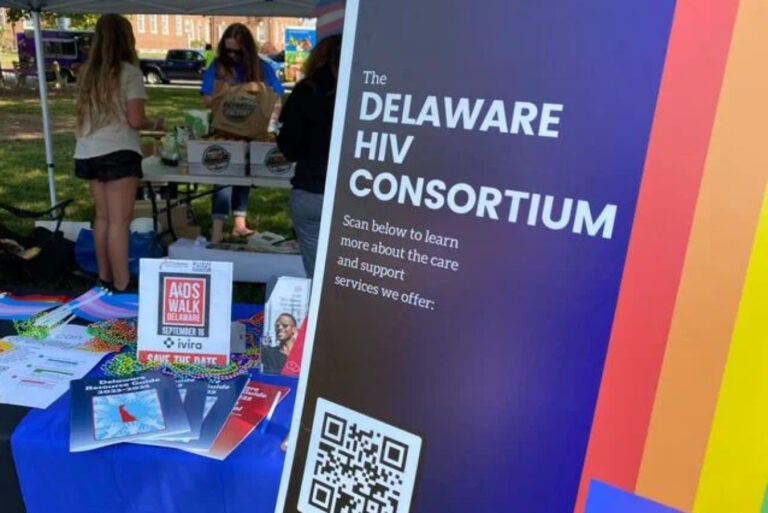Possible HIV funding cuts could ‘wipe out’ Delaware prevention program
Delaware groups that provide HIV prevention, testing and treatment fear their federal support could soon disappear.
Listen 1:23
File - An event held in 2023 by the Delaware HIV Consortium (Delaware HIV Consortium/Facebook)
From Philly and the Pa. suburbs to South Jersey and Delaware, what would you like WHYY News to cover? Let us know!
For decades, federal funding has served as the backbone for HIV prevention, treatment, and support services across the country. But with the Trump administration’s Health and Human Services Department canceling an array of grants related to HIV research, the stability of these critical programs hangs in the balance. It’s especially concerning in smaller states like Delaware, where community-based organizations often bridge the health care gap.
The possible rollback of program funding could sharply limit access to life-saving medications like PrEP – a daily pill that drastically reduces the risk of HIV transmission – while also slashing outreach resources that reach marginalized groups, including LGBTQ+ individuals, Black and Latino populations, and people experiencing homelessness.
Delaware is already feeling the strain of these changes. Programs that once relied on steady federal support now face tough decisions about how to continue serving those in need.
“There’s roughly 4,000 people in Delaware living with HIV as of right now,” said Tyler Berl, executive director of the Delaware HIV Consortium. “If you think about it in terms of Delaware’s population, that’s roughly one out of every 250 Delawareans currently living with HIV. HIV is found in every ZIP code in every county across our state and it impacts all of our communities.”
At the heart of advocates’ concerns is the potential dismantling of the Centers for Disease Control and Prevention’s Division of HIV Prevention, which currently provides between $700 million and $1.3 billion to support national prevention efforts.
“In terms of impact here in Delaware roughly $1.1 million comes from the CDC Division of HIV Prevention to the Delaware Division of Public Health. It funds roughly virtually their entire HIV prevention apparatus [including] both tracking and epidemiology surveillance of HIV and HIV outbreaks here in Delaware,” Berl said. “But also through things like the entire community-based response for HIV prevention.”
That funding also supports free testing, educational efforts, distribution of condoms and other safe sex supplies, and access to PrEP.
The Delaware HIV Consortium, the state’s longest-running organization focused on fighting the epidemic, receives about $50,000 of that money to guide individuals through the PrEP process.
“So if someone’s interested in the drug PrEP, we would link them to care and help them overcome all the barriers to stay on PrEP so they can stay HIV negative,” Berl said.
Yet, despite the critical role they play, organizations like the Consortium have already seen funding shrink dramatically.
“Over the last two years, we’ve lost roughly 80% of our public contracts for HIV prevention,” he said. “We’re operating all of our prevention services at a loss. And so, a further reduction in funds could truly wipe out our prevention program.”
Meanwhile, the local need for services is rising. Since 2020, Delaware has seen a jump in new HIV cases.
“We’ve seen year-over-year cuts in HIV prevention of roughly 65% cuts in public HIV prevention funds over the last two years. At the same time, we’ve seen a roughly 25% increase in new diagnosis for HIV since 2020,” he said. “So we’re concerned that any further reduction or erosion of the HIV prevention sector could truly lead to a vast increase in HIV.”
Adam Skrzynski, an infectious disease physician with the Holloway Community Program at ChristianaCare, sees firsthand how deeply federal funding shapes access to HIV care in Delaware. On any given day, he treats individuals either seeking preventative care like PrEP, or beginning treatment after being diagnosed with HIV.
“Most of my day is spent either treating HIV infections or seeing patients for HIV pre-exposure prophylaxis therapy,” Skrzynski said. “Some of the more tragic cases… have been those who had been actively seeking out PrEP, had not been able to find it, and then were infected with HIV.”
He said the most affected population will be those of low-income status.
“We serve an urban population with low socioeconomic status for the most part. And this population absolutely depends on federal funding to fully access the full range of HIV care and services including their life-saving medication,” he said. “Withdrawal of funds would be quite devastating to our patient population.”
Among the programs at risk is the Ryan White HIV program, a federal initiative that provides comprehensive care for people with HIV, especially those who are uninsured or underinsured.
“So far, we’ve not experienced any cuts to the Ryan White treatment program, which is very fortunate and has allowed people to continue on their HIV medications. But a withdrawal of federal funding for HIV treatment would be absolutely catastrophic,” Skrzynski said. “People would be left with sometimes very high co-pays. And in some cases, Ryan White provides the full insurance for people who are being treated for HIV. So loss of that federal funding could leave people without treatment entirely.”
For now, future cuts remain uncertain. But Berl said if public health is truly a local responsibility, the state should step up.
“Public health is a local matter and the state’s general operating budget has never provided any funds for community-based HIV prevention services,” Berl said. “And so if this is a truly public health matter at the local level, then it might be worth considering to include HIV prevention services in the state in the state budget itself.”
This story was supported by a statehouse coverage grant from the Corporation for Public Broadcasting.

Get daily updates from WHYY News!
WHYY is your source for fact-based, in-depth journalism and information. As a nonprofit organization, we rely on financial support from readers like you. Please give today.








